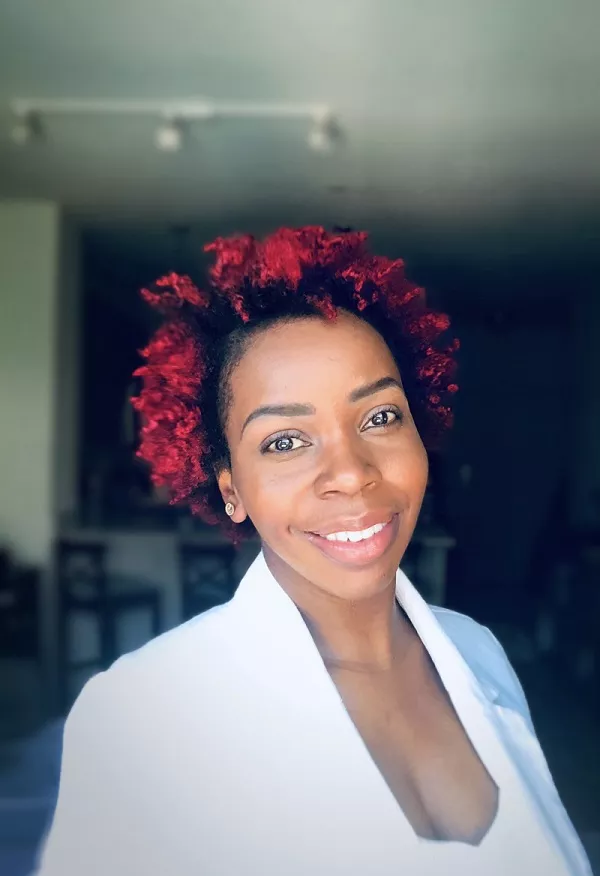Fellow Spotlight: Meet Whitney Sewell, PhD, MSW


DPM is home to several postdoctoral fellowships that serve trainees from several clinical and research disciplines. Research fellows receive strong mentorship, support, and regular feedback on their work including how to achieve their desired goals and steps to increasing career trajectory both at DPM and beyond.
In their own right, these trainees bring a rich, diverse skill set and dynamic research interests to DPM, and from their fellowships transition into clinical, research, and leadership roles around the world. We hope to highlight the work of current DPM fellows in a new series we're calling Fellows Spotlight.
Meet Whitney Sewell, PhD, MSW. Dr. Sewell received her doctoral degree in social work from the Brown School of Social Work, at Washington University in St. Louis, and completed a master’s degree in social work at the University of North Carolina at Chapel Hill. She told us more about her path to her current fellowship, studying under DPM faculty members Julia Marcus, PhD, MPH and Douglas Krakower, MD, MPH. She also offers advice to up-and-coming doctoral students on how to build a successful career (hint: sometimes, it requires taking a leap of faith from one's predetermined plan).
Q: Tell us about your path to becoming a post-doctoral fellow at DPM. What was your journey like?
A: I was a PhD candidate completing my dissertation at the Brown School of Social Work at Washington University in St. Louis and my advisor forwarded an email announcing the application cycle for the Thomas O. Pyle Fellowship. What was particularly exciting about the fellowship announcement was a short sentence that stated that they were seeking a fellow to contribute to “studies related to HIV prevention, particularly implementation of HIV preexposure prophylaxis,” and I just knew that the opportunity was for me. Of course, there are those feelings of uncertainty when applying for positions, and to be honest, I originally planned to stay another year in my PhD program, but I refused to pass up an opportunity to leap and see where I would land.
When I reflect on my path to becoming a post-doc I can immediately acknowledge that it was not a straight path. Sometimes (often times) we all have this unnerving urge to plot out and plan our trajectory; we are even asked to do so for training proposals, job interviews, and grant applications. I think it is valuable to be forward-thinking, but not forward-living. I read somewhere, “If you become too obsessed with the map, the mountain you seek might be right in front of you, but still you will not be able to see it.” I share that to say, my journey involved looking up from my map to be present and pursue opportunities I may have otherwise overlooked because it was not a part of my plan.
I think it is valuable to be forward-thinking, but not forward-living...my journey involved looking up from my map to be present and pursue opportunities I may have otherwise overlooked because it was not a part of my plan.
Q: What kind of research do you do? What sort of impact do you hope it will make?
A: Broadly, I lead research that centers the African-American woman’s experience as the primary mechanism for addressing the multilevel factors that contribute to sexual and reproductive health disparities and inequities among African-American women. More specifically, my research focuses on improving the implementation of pre-exposure prophylaxis for HIV prevention in African-American women. My approach involves asking women: what do they want? And privileging that information throughout the development of research projects and interventions to improve PrEP uptake for African-American women.
Sexual health is more than disease prevention and it is my hope that my research promotes empowerment, choice, and access for African-American women.
By empowerment I mean that it is my hope that my research is instrumental in the development of services that improve sexual health outcomes, as well as encouraging sexual health knowledge sharing, development, and critiquing for African-American women.
I state choice because I hope my research will support the inherent right for African-American women to choose the sexual health care that aligns with their health and lifestyle needs, wants and desires free of discrimination, stigma, shame, harm, and cost. And access—access is so key and I can only hope my work strengthens the existing ongoing efforts of many scholars and scientists to identify and dismantle longstanding barriers to quality comprehensive sexual and reproductive health care for African-American women, most of which are rooted in racism, sexism, heterosexism, and ableism.
Q: Tell us about your fellowship projects. What inspired this/these projects? How will these projects help you meet your career goals?
A: My current fellowship projects focus on non-daily PrEP use among men who have sex with men. This is important because PrEP, typically used as a once-daily pill, has also been shown to be effective for this population when users adopt non-daily strategies. Although not universally endorsed, several professional societies and local departments of health have endorsed non-daily PrEP use, and despite the lack of endorsement from CDC, men who have sex with men are already reporting non-daily PrEP use. I find this intriguing because it truly reflects the reality that no matter the clinical recommendations, when it comes to medication adherence people are prone to doing what they feel is comfortable or right for them and their lifestyle. Identifying the prevalence of these patterns of PrEP use encourages health authorities to acknowledge the medication practices and preferences of their target users and respond in a manner that addresses their needs. This aligns with my training goals, which seek to identify and understand the PrEP preferences and practices of African American women. I am working on an NIH K-award application focused on PrEP implementation for African American women.
Sexual health is more than disease prevention and it is my hope that my research promotes empowerment, choice, and access for African-American women...I can only hope my work strengthens the existing ongoing efforts of many scholars and scientists to identify and dismantle longstanding barriers to quality comprehensive sexual and reproductive health care for African-American women, most of which are rooted in racism, sexism, heterosexism, and ableism.
Q: Which Institute faculty member(s) is/are you working with? How did you came to meet them?
A: I work with Drs. Julia Marcus and Doug Krakower. I met them when interviewing for the fellowship. And…you didn’t ask this…but they are awesome. I am very fortunate to have them as my mentors. They are not only brilliant, but compassionate, accessible, productive, present, and they see me. They see ME, and are intentional in mentoring me along a path that aligns with who I am becoming as a scientist and where I seek to be in my career. So much gratitude.
Let me be very clear. When I state, they see “ME”, I mean they see my race, my gender, my journey and in the same light they see my intelligence, integrity, work ethic, and leadership. They have demonstrated countless times the ability to make space for all of those “MEs” without diminishing one or the other but instead being comfortable and quite frankly fearless in their willingness to stand firmly in the brilliance of it all. I am in a perpetual state of inspiration and expansion under their mentorship, and I aspire to mentor others in the manner they have mentored me.
Q: What advice do you have for those interested in pursuing a doctorate, or who are in the early stages of a doctoral program? What are some resources that might be helpful?
A: In my opinion, PhD training is an opportunity to 1) develop a robust knowledge base that prepares you to ask relevant, critical, and innovative questions and 2) identify and start to develop the skills that you will use to answer those questions throughout your research career.
As far as resources, I always recommend that pre/post-doctoral scholars develop an Individual Development Plan (IDP). I will link a helpful IDP resource for predoctoral students provided by Harvard Medical School here. This is something you can go over with your advisors, mentors, and is a living document that can evolve from predoctoral to postdoctoral training, early-career and beyond.
Oh and remember that map I mentioned, yep—put the map down and pick up a toolbox. As a PhD student make a commitment to adding tools to your toolbox. Be aware of your program’s resources and opportunities and be strategic in how to use those existing resources to build your toolbox. Identify and work with advisors and mentors who are positioned to help guide you through the PhD process. Some of the best mentors are those that are only a few years ahead of you, so connect with those more advanced students in your program; I believe peer-mentorship is key. And know that you are the carpenter and around you are the materials, tools, and team you need to construct the doctorate experience and research career that is best for you.
Know that you are the carpenter and around you are the materials, tools, and team you need to construct the doctorate experience and research career that is best for you.
Also, please feel free to email me. I enjoy speaking with pre/post doctoral scholars and sharing resources, experiences, insights, while growing my network of colleagues and collaborators!
Contact Dr. Sewell | Follow Dr. Sewell on Twitter | Learn more about the Thomas O. Pyle Fellowship